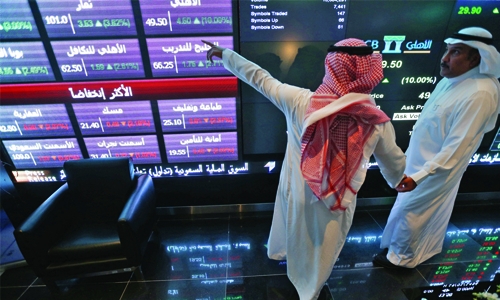Most Gulf stocks in red over Syria tension
Dubai : Most Gulf stock markets closed lower yesterday as the threat of U.S. military action in Syria kept investors on the sidelines, but the Saudi Arabian market stabilised after a sell-off on the previous day.
In Egypt, the index fell 1.8 per cent as investors booked profits, overwhelming a 1.4pc gain on Wednesday. Banking and property stocks were hit hard with Commercial International Bank falling 3.3pc.
Property firm Madinet Nasr for Housing and Development dropped 6.5pc after soaring on Wednesday on news that it would discuss a possible merger with SODIC. SODIC rose a further 1.8pc.
Saudi Arabia’s index was up 0.3pc, regaining some strength after Wednesday’s 1.9pc slide. The index is still up 8pc this year on fund flows that occurred before index compiler FTSE Russell announced in late March that it would upgrade Riyadh to emerging-market status.
“One has to remember that the Saudi market’s recent rally has been mainly flow-driven, so investors will be tempted to book profits in the short term,” said Nishit Lakhotia, head of research at SICO.
Al Rajhi Bank ended 0.9pc higher, but many other banking shares ended lower with Saudi British Bank falling 2.6pc.
Retailer Jarir Marketing edged down 0.1pc, closing well off the day’s lows, after reporting a fall in first-quarter estimated net profit to 219.1 million riyals ($58.4m), in line with analysts’ estimates.
Dubai’s index closed 1.2pc lower, weighed down by property stocks. Emaar Properties, the largest property developer, dropped 2.0pc.
Amusement park operator DXB Entertainments rose early after it said first-quarter visits totalled a record 851,000, up 45pc from a year earlier. But the rally ran out of steam and the stock closed 1.6pc lower.
The Abu Dhabi index slipped 0.8pc, hit by weak financial and property stocks. Aldar Properties fell 1.9pc.
Qatar’s index lost 1.1pc, hurt by banking stocks with Commercial Bank tumbling 4.3pc. But the index still rose 1.4pc over the week after several blue-chip firms raised foreign ownership limits, which promises to increase their weights in emerging market indexes.
Related Posts

